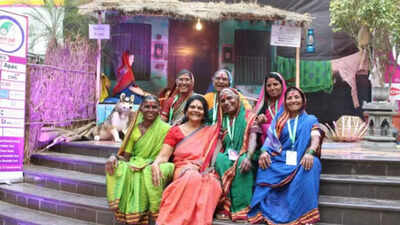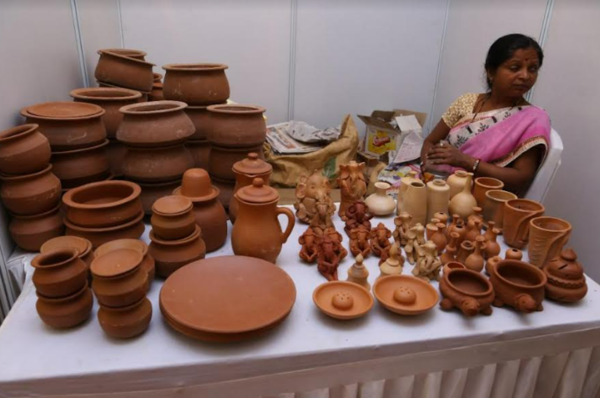Top Searches
- News
- City News
- mumbai News
- Artisans from drought prone Satara to sell local millets, handicrafts in Mumbai
Artisans from drought prone Satara to sell local millets, handicrafts in Mumbai

The Mann Deshi Mahotsav will unravel the grit and creativity of women from one of Maharashtra's driest regions of Satara.
MUMBAI: Over 25 years ago, the shepherd women of drought-prone Satara lived off the land, rearing goats and sheep, and would supplement their income by working as construction labourers or toiling in sugar factories in the big cities. Until a private intervention trained them as artisans by harnessing local resources. Now 25 years later, the diffident women have become confident entrepreneurs who will exhibit their food and artisanal products in Mumbai.
The Mann Deshi Mahotsav will unravel the grit and creativity of women from one of Maharashtra's driest regions of Satara. The four-day festival is scheduled to take place at Ravindra Natya Mandir, Prabhadevi, from January 5-8.

"This year, the exhibition will also host art forms such as Rogan art from Kutch, Jain durries from Mann taluka and Kasuti art from Karnataka. Stalls will sell chemical free grain, millets, homemade ready to eat foods, the famous kharda chutneys especially peanut, jowari bread, kurdya, masavadya and kandi peda. Stone vessels used for grinding are a specialty. People can also participate in live pottery demonstrations, weave baskets or make lac bangles," said organiser Chetna Sinha. A full cultural feast including the Gajji folk dance, Bharud poetry by Sangeet Natak Akademi award winner Chandatai Tiwadi, girls' wrestling matches and storytelling sessions are on the anvil.
The annual Mann Deshi Mahotsav started in 2017 but was truncated during Covid and has now resumed after a two-year gap. Sinha, founder of the Mann Deshi Bank and trust, said, "Satara district is a study in climate contrast. On the one hand you have Mahabaleshwar which receives the highest rainfall in the state and on the other there is Mann region which has the lowest rainfall in Maharashtra. It is an acute drought prone area."

The local population of this mountainous region largely comprises shepherds who had no gainful employment. The trust slowly began to generate opportunities by opening a rural bank, even a business school on wheels because the villagers were so poor they could not afford to take a bus to the skilling centre. And the business model drew on local resources. Since they tend goats and sheep, the shepherds were trained to prepare milk based products, weave woollen handicrafts and prepare food items from millets that are grown in the region and comprise their basic diet.

Director Ashutosh Gowariker and actress Mrinal Kulkarni will inaugurate the exhibition January 5 while BJP MLA Ashish Shelar is chief guest. Kulkarni said, ``I am looking forward to this event because it is a worthy cause. A lot of rural women have skills that can blossom extremely well with a little support. The organisers have been relentless in their backing of these women. I know because I was invited last time too but could not attend."
The Mann Deshi Mahotsav will unravel the grit and creativity of women from one of Maharashtra's driest regions of Satara. The four-day festival is scheduled to take place at Ravindra Natya Mandir, Prabhadevi, from January 5-8.

"This year, the exhibition will also host art forms such as Rogan art from Kutch, Jain durries from Mann taluka and Kasuti art from Karnataka. Stalls will sell chemical free grain, millets, homemade ready to eat foods, the famous kharda chutneys especially peanut, jowari bread, kurdya, masavadya and kandi peda. Stone vessels used for grinding are a specialty. People can also participate in live pottery demonstrations, weave baskets or make lac bangles," said organiser Chetna Sinha. A full cultural feast including the Gajji folk dance, Bharud poetry by Sangeet Natak Akademi award winner Chandatai Tiwadi, girls' wrestling matches and storytelling sessions are on the anvil.
The annual Mann Deshi Mahotsav started in 2017 but was truncated during Covid and has now resumed after a two-year gap. Sinha, founder of the Mann Deshi Bank and trust, said, "Satara district is a study in climate contrast. On the one hand you have Mahabaleshwar which receives the highest rainfall in the state and on the other there is Mann region which has the lowest rainfall in Maharashtra. It is an acute drought prone area."

The local population of this mountainous region largely comprises shepherds who had no gainful employment. The trust slowly began to generate opportunities by opening a rural bank, even a business school on wheels because the villagers were so poor they could not afford to take a bus to the skilling centre. And the business model drew on local resources. Since they tend goats and sheep, the shepherds were trained to prepare milk based products, weave woollen handicrafts and prepare food items from millets that are grown in the region and comprise their basic diet.

Director Ashutosh Gowariker and actress Mrinal Kulkarni will inaugurate the exhibition January 5 while BJP MLA Ashish Shelar is chief guest. Kulkarni said, ``I am looking forward to this event because it is a worthy cause. A lot of rural women have skills that can blossom extremely well with a little support. The organisers have been relentless in their backing of these women. I know because I was invited last time too but could not attend."
Start a Conversation
FOLLOW US ON SOCIAL MEDIA
FacebookTwitterInstagramKOO APPYOUTUBE









